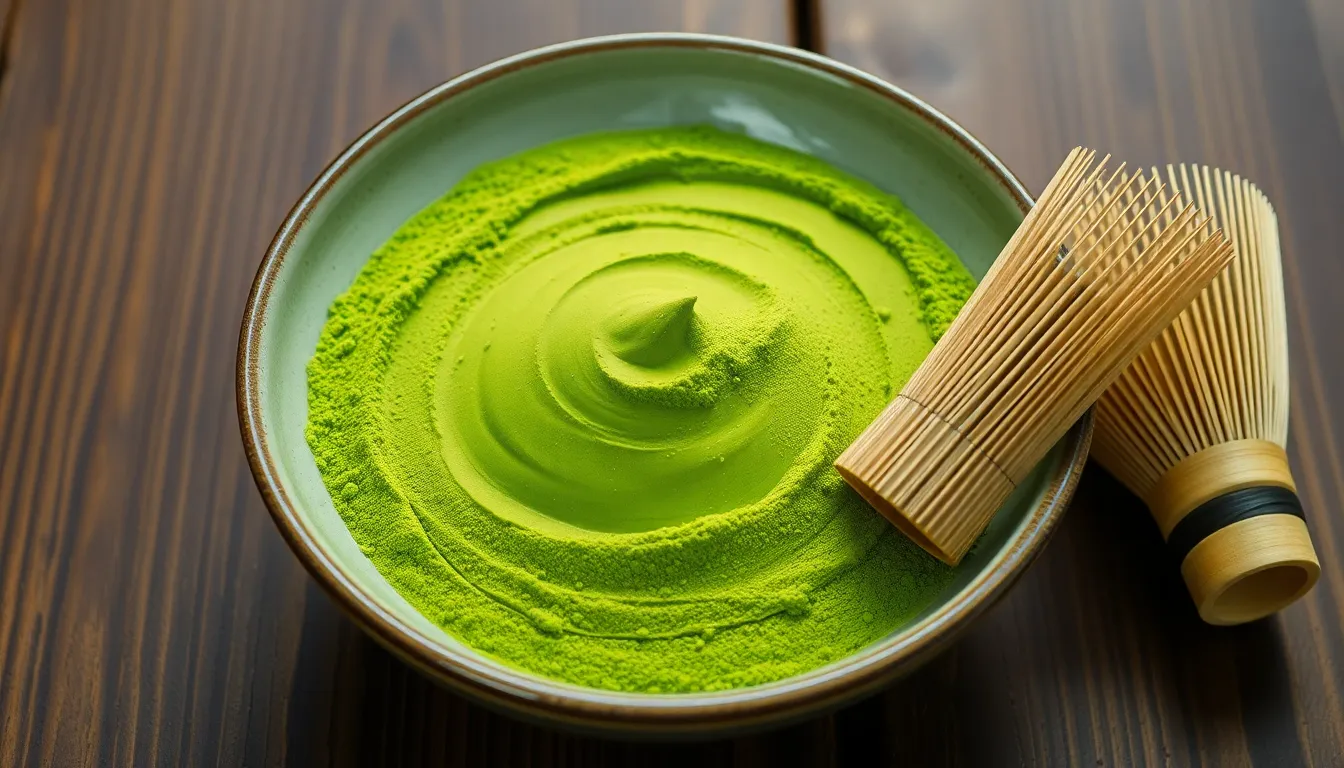Matcha has taken the wellness world by storm, captivating tea lovers and health enthusiasts alike. This vibrant green powder isn’t just a trendy beverage; it’s packed with numerous health benefits. One of the most common questions surrounding matcha is its caffeine content. Understanding how much caffeine is in matcha can help individuals make informed choices about their daily consumption.
Unlike traditional green tea, matcha offers a unique caffeine experience. It provides a more sustained energy boost without the jitters often associated with coffee. By exploring the caffeine levels in matcha, readers can better appreciate its role in their daily routines. Whether seeking a morning pick-me-up or an afternoon refresher, knowing the caffeine content can make all the difference.
Table of Contents
ToggleUnderstanding Matcha
Matcha is a finely ground powder made from shade-grown tea leaves. It offers a vibrant green color and is rich in antioxidants. These antioxidants, particularly catechins, contribute to many health benefits, including metabolism support and improved mental focus.
Matcha’s caffeine content varies based on preparation methods and the specific grade of matcha used. Generally, one gram of matcha contains about 25-40 milligrams of caffeine. For comparison, a cup of brewed coffee typically contains 95 milligrams of caffeine. This means that consuming matcha can provide a moderate caffeine boost without the rapid spikes and crashes often associated with coffee consumption.
The presence of L-theanine in matcha plays a significant role in its unique caffeine experience. This amino acid promotes relaxation and focus, balancing the stimulating effects of caffeine. Consequently, individuals consuming matcha may experience sustained energy levels and enhanced cognitive function without the jitters.
Overall, understanding matcha’s composition and caffeine content helps individuals make more informed dietary choices and better enjoy its potential benefits.
Caffeine Content in Matcha

Matcha contains a moderate caffeine content, offering a unique energy boost. Understanding its levels compared to other beverages helps individuals incorporate it effectively into their diet.
Matcha Vs. Other Green Teas
Matcha generally has higher caffeine levels than other green teas. A serving of matcha, typically one gram, contains around 25-40 milligrams of caffeine. In comparison, traditional green teas average about 20-35 milligrams per cup. The increased caffeine content in matcha results from its preparation, which uses whole tea leaves ground into powder, providing more concentrated nutrients and caffeine.
Factors Influencing Caffeine Levels
Several factors influence the caffeine content in matcha. These include:
- Grade of Matcha: Higher grades, such as ceremonial matcha, generally have more caffeine due to the younger, more tender leaves.
- Growing Conditions: Shade-grown matcha increases chlorophyll and amino acid levels, affecting caffeine concentration.
- Preparation Methods: The amount of matcha powder used in a serving directly influences caffeine levels; more powder leads to higher caffeine intake.
- Water Temperature: Brewing at lower temperatures can extract more caffeine and flavor compounds without bitterness.
By considering these factors, individuals can better gauge the caffeine levels in matcha and adjust their consumption accordingly.
Health Benefits of Caffeine in Matcha
Matcha offers several health benefits attributed to its caffeine content, enhancing cognitive performance and physical well-being. Understanding these benefits helps maximize the positive effects of matcha consumption.
Mental Clarity and Focus
Caffeine in matcha, combined with L-theanine, promotes improved mental clarity and focus. This combination fosters a state of relaxed alertness, allowing for better concentration on tasks. The presence of L-theanine mitigates the spike and crash associated with caffeine, offering steadier cognitive performance. Research indicates that this synergistic effect can enhance attention, memory, and overall cognitive function, making matcha a popular choice for individuals seeking to boost productivity.
Energy Boost Without Jitters
Matcha provides a gradual energy boost without the jitters often experienced with coffee. The caffeine in matcha ranges from 25-40 milligrams per gram, offering substantial energy enhancement while minimizing overstimulation. This leads to sustained energy levels, ideal for a busy lifestyle. As a result, matcha serves as an effective alternative for those wanting to avoid the sudden spikes and drops in energy.
Recommended Matcha Serving Sizes
Matcha serving sizes can vary based on individual preferences and desired caffeine intake. Standard recommendations suggest the following:
- 1 gram: Contains approximately 25-40 milligrams of caffeine. This amount suits individuals new to matcha, offering a mild energy boost.
- 2 grams: Provides around 50-80 milligrams of caffeine, ideal for those wanting a noticeable lift without excessive stimulation. This serving size is common for traditional matcha preparation.
- 3 grams: Contains about 75-120 milligrams of caffeine. This larger serving can satisfy experienced users seeking higher energy levels.
- 4 grams or more: Yields 100-160 milligrams of caffeine. This amount caters to avid matcha drinkers looking for significant energy and focus.
Considering these serving sizes can help individuals tailor their matcha consumption according to their caffeine tolerance and lifestyle needs. Adjustments in serving sizes may be necessary based on personal response to caffeine and the desired effects.
Matcha stands out as a unique source of caffeine that offers a balanced energy boost. With its combination of caffeine and L-theanine, it fosters a state of relaxed alertness that enhances mental clarity and focus. This makes it an appealing alternative for those who want to avoid the jitters associated with traditional coffee.
By understanding the varying caffeine levels in matcha and how to adjust serving sizes, individuals can tailor their consumption to fit their personal needs. Whether someone is new to matcha or a seasoned drinker, it provides a delicious way to elevate energy and productivity throughout the day.









